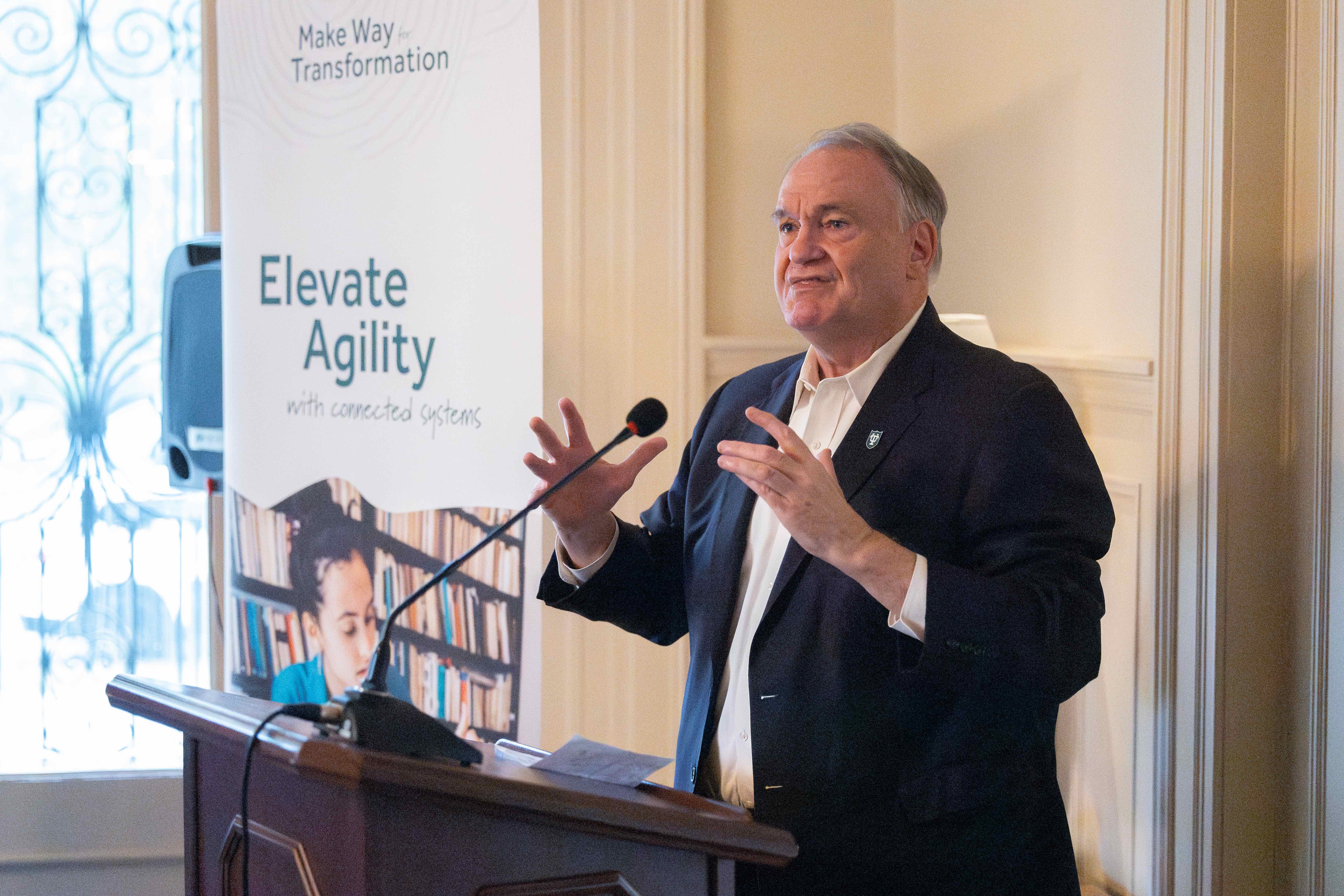Project Overview

Check out the WaveWorks! Video

About WaveWorks!
WaveWorks! is the project name for the transformational initiative to implement our new cloud-based information technology platform, Oracle Cloud. Oracle Cloud will replace our current, aging information systems for finance, budget & planning, and human resources, allow us to adopt best practices in these areas and offer vastly better functionality than our current systems.
Guiding Principles
- Utilize proven cloud vendor with software industry best-practice processes
- Focus on essential business functions as a priority
- Resource and staff appropriately throughout the project, from kickoff to post go-live
- Communication first, there is no such thing as over communicating
- Implementation will be an iterative design process
- Transparency and inclusion: end users should be aware and included in design, and change management efforts should be prominent
- Simplification and standardization, favor "out-of-box" over customization
- One system of record (single source of truth for our data)
Why is Tulane making this change?
- Tulane's HR and finance operations run on EBS, which reaches end-of-life in 2030
- We will replace EBS with Oracle Cloud to enhance our daily work lives and ensure we are all better able to focus on our important core mission and objectives
- Oracle Cloud will provide many benefits:
- Vastly better functionality
- Business transformation through best practice processes, capabilities, and tools
- Greatly enhanced organizational efficiency
Stay Up to Date
Resources
Who is involved in this project?
Our Executive Sponsors, Steering Committee and project Team members are all apart of this project.
What support will be provided to us for our move to Oracle Cloud?
Tulane will be closely supporting all our users in the Oracle Cloud journey with training, embedded learning right in the Oracle Cloud modules, training of super user coaches in schools and departments, reference materials, and a dedicated support team to answer queries.
Do we really need to replace our current systems?
Yes! Tulane is currently managing financial and operational needs through Oracle EBS, which reaches end-of-life in 2030. There will be minimal vendor investment in this legacy product in the next 10 years. Likewise, the current financial system setup utilizes multiple applications in silos, which hampers our ability to do business in a streamlined, integrated fashion. Some units have had to create shadow systems for data retrieval and reporting to mitigate these issues. In a recent assessment, 50% of HR-related and 30% of Finance-related processes were noted as pain-points for end users and/or central administrative staff. Finally, our systems for finance, as well as for HR, were designed and configured sub-optimally, resulting in platforms that hinder process effectiveness and efficiency, do not provide necessary analytical tools, and negatively impact the services provided to all Tulane colleagues.
Oracle Cloud will offer leading edge functionality to support our HR, finance, and budgeting processes as well as the end-user experience.
What does the term "ERP" mean?
ERP stands for “Enterprise Resource Planning (ERP),” and while this term sometimes generally refers to business enterprise-level IT platforms (and indeed we used it in this way in the past), in Oracle Cloud “ERP” has a very specific meaning: it is the Financial Module of Oracle Cloud. Therefore, at Tulane the ERP will refer specially to this Oracle Cloud finance module.
Isn’t Oracle the existing system we want to replace?
The Oracle Cloud platform is a completely different system than the Oracle EBS system in use at Tulane, a legacy Oracle product which reaches end-of-life in 2030. Oracle Cloud will offer transformative functionality to enhance our work and professional lives at Tulane. You can view the key benefits to learn more.
When will the new systems be implemented?
We anticipate going live with Oracle Cloud in January 2026. You can view the project timeline to see more.
Will I be able to contribute my thoughts, ideas, and suggestions to this project?
Absolutely! We will offer a myriad of ways for faculty and staff to contribute their thoughts, reactions,ideas, and suggestions throughout the project. In fact, we invited over 160 colleagues across Tulane in representative roles to give their input on the selection of the vendor. There will also be frequent opportunities and multiple ways for everyone to provide suggestions and comments on new work processes related to the system. Opportunities to participate will include contributing to project work streams, system testing, events such as in forums and town halls, as well as occasional user surveys. You can also reach the project team on this email: WaveWorks!@tulane.edu
What is Drivestream?
Drivestream, an Oracle Cloud Partner, has over 20 years working with 200+ organizations on transition to the cloud and has performed over 270 Oracle Cloud projects for clients. Drivestream will support us across the all phases of the project, including preparation, development, testing, launch and post-go-live support.
Advisory Committee
The Advisory Committee for the WaveWorks! Project will be composed from across all of Tulane, notably from our schools, centers, and department. The Advisory Committee will meet periodically upon achievement of milestones, to hear updates on progress. to provide important input on the direction of the project and to advise on key decision points and project plans.
ADKAR
The Prosci ADKAR® Model is one of the two foundational models of the Prosci Methodology. The word “ADKAR” is an acronym for the five outcomes an individual needs to achieve for a change to be successful: Awareness, Desire, Knowledge, Ability and Reinforcement.
Drivestream
Given the breadth and complexity of the WaveWorks! project, we are partnering with a leading systems integration firm, Drivestream. We chose Drivestream as our partner after an in-depth selection process to support us across the all phases of the project, including preparation, development, testing, launch and post-go-live support.
Drivestream Academy
Drivestream Academy is a key resource for all of us at Tulane to learn more about Oracle Cloud and the core modules of the software we are deploying.
EPM
EPM is an acronym for Enterprise Performance Management. In the Oracle Cloud environment this is a module which offers functionality to support budgeting, reporting and planning. Process supported include: annual budgeting, account reconciliation, production of financial statements, multi-year forecasting, Integrated multi-system reporting and analytics, and productivity reports. The other core modules are ERP and HCM.
ERP
ERP is an acronym for Enterprise Resource Planning. At Tulane and within the Oracle Cloud environment, ERP refers to the Finance module of the Oracle Cloud suite of solutions which support all finance functions, such as grants management, expense processing, accounts payable and receivable, capital projects, procurement, and general ledger. The other core modules are HCM and EPM.
(Note, sometimes this term is used to refer broadly to an entire suite of business management software to collect, store, manage and interpret data from many business activities. But at Tulane it refers specifically - and only – to the financial software of Oracle Cloud.)
Executive Committee
The WaveWorks! Executive Committee is the ultimate leadership group leading the project. It is composed of our project’s Executive Sponsors: Patrick Norton Senior Vice President and Chief Operating Officer and Robin Forman Senior Vice President of Academic Affairs and Provost, project leadership, senior executives from Oracle, and leaders from Drivestream. The role of the Executive Committee is to set strategic direction for the project, provides active and visible sponsorship, communicate regularly to the project team and to the Tulane community, and to provide our Executive Sponsors with insights to make strategic decisions on issues escalated by Steering Committee.
HCM
HCM is an acronym for Human Capital Management. At Tulane and within the Oracle Cloud environment, HCM refers to the human resources module of the Oracle Cloud suite of solutions. HCM supports all HR functions, such as compensation and labor distribution; payroll, time & attendance scheduling; recruiting, talent management, and learning; employee onboarding and off-boarding; and centralized employee data/profiles. The other core modules are ERP and EPM.
IRDW
IRDW is an acronym for Interactive Requirements Design Workshop. The goal of an IRDW is to identify and validate core requirements for Tulane in each module of Oracle Cloud (ERP, HCM and EPM) so that these requirements can be integrated into the configuration of these modules for the university. Numerous IRDWs have been held at Tulane, and participants are the project.
Module
We refer to the specific functionality within Oracle Cloud as modules. For example, modules would include functionality such as accounts payable or procurement within ERP or recruitment and benefits within HCM.
Oracle Cloud
Oracle Cloud is the cloud computing service and platform offered by Oracle Corporation providing servers, storage, network, applications and services through a global network of managed data centers. After extensive research by Tulane and our intensive and rigorous request for proposal (RFP) process, involving many hours of demonstrations with the leading cloud vendors, we chose Oracle Cloud as the best fit for Tulane’s strategy, requirements and mission.
Prosci
The Prosci Methodology is recognized as a leading change management methodology utilized my organizations around the world and is being rolled out across Tulane as part of the WaveWorks! project. It is a structured, adaptable and repeatable approach to enable the people side of change and deliver organizational results. Change practitioners apply the Prosci Methodology to create change management strategies and plans that increase adoption and usage on their critical change projects and initiatives. (Source: Prosci, Inc.)




